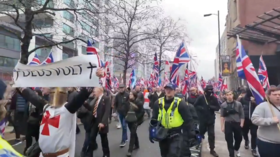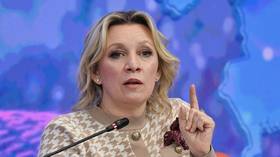Can Ukraine be pulled back from the brink?
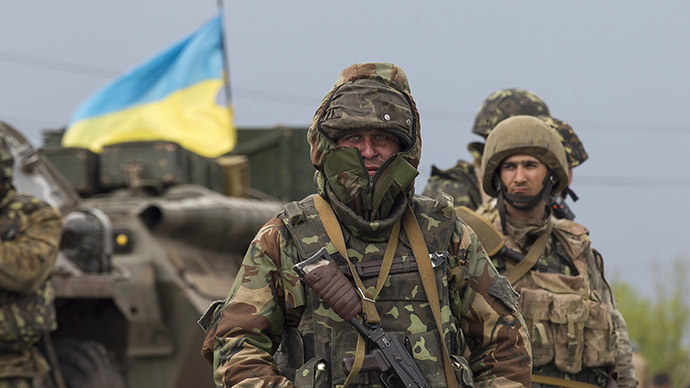
Kiev’s military offensive into the east and south of Ukraine has all but ensured the failure of the Geneva agreement, setting the stage for a Russian response as NATO deploys troops to the region.
As the bloody military crackdown continues in predominately Russian-speaking areas of the country, the deteriorating situation in Ukraine has given rise to appalling inter-ethnic violence. The wave of pro-autonomy protests has swept through at least 17 cities and towns in the east and south of Ukraine, as activists occupy public buildings to demonstrate their rejection of the putsch regime in Kiev that unconstitutionally usurped power in late February. Ukraine’s military – with assistance from ultra-nationalist militiamen aligned with the Right Sector – has focused its assault on key cities such as Slovyansk, Kramatorsk, and Lugansk. During clashes between pro-autonomy protestors and ultra-nationalists in Odessa, sources indicate that members of the Right Sector were behind the deadly fire set in the Trade Unions House in Odessa, which killed dozens of activists who holed themselves up inside the building. In towns and villages under siege, members of the Right Sector have allegedly opened fire on unarmed anti-Kiev activists attempting to block ultra-nationalist militias from entering their villages.
These developments are extremely troubling when considering that members of the Right Sector and other groups with neo-Nazi ideals have been integrated into high positions in the Kiev regime. The group’s leader, Dmitry Yarosh, claims that all of the Right Sector’s actions are coordinated with the unelected authorities in Kiev. The agreement ironed out in Geneva on April 17 calling for an end to the occupation of public administration buildings and the disarming of all illegal military formations in Ukraine has not been observed by either side, while Kiev’s brutal offensive against pro-autonomy activists is an open transgression of the deal. Much like the agreement brokered in February prior to the ouster of former president Viktor Yanukovich, the putsch regime in Kiev has failed entirely to adhere to its commitments to make substantive steps in defusing the crisis. The EU and Washington have provided diplomatic and moral cover to Kiev despite its transparent failure to adhere to the Geneva deal by laying all the blame for this situation on Moscow’s shoulders. Despite making countless allegations against Moscow in the media and at the UN, the backers of the Kiev regime have yet to present any hard evidence of Russia’s direct support for demonstrators or involvement in eastern and southern Ukraine.
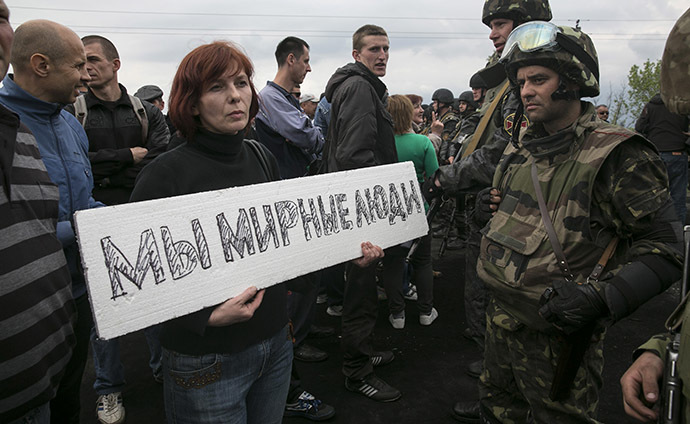
Containment 2.0
Just a few months ago, US Secretary of State John Kerry was vocal in his disapproval of the Yanukovich government’s crackdown on armed protestors at Maidan, where riot police used “bulldozers and batons” to disperse crowds. Leaders from the US and Europe denounced the elected government and championed the cause of the protestors as they occupied public buildings and called for regime change. In a remarkable turn-around, the Obama administration has extended its support for Kiev’s crackdown on pro-autonomy protestors, characterizing the operation as a proportionate and reasonable response to the turbulence in eastern Ukraine. Those same American and European leaders today denounce protestors as they occupy public buildings, while backing the unelected regime to the hilt. For the Obama administration to sanction Kiev’s assault on protesters with legitimate social grievances and democratic demands using tanks, helicopter gunships, and automatic weapons is an inexcusable display of hypocrisy and duplicity. Sources also indicate that the CIA and FBI are actively advising Kiev as it pursues military operations in the east, as many speculated following the recent visits of Joe Biden and CIA director John Brennan to Ukraine.
It’s no secret that the United States is running the show in Ukraine. The Obama administration’s antagonistic stance towards Russia is proof enough that it does not objectively consider Moscow’s point of view. Washington’s actions prove that it is not a sincere negotiating partner in trying to defuse the turbulence in Ukraine – it is more interested in leveraging the crisis to cripple Russia’s economy and create a global consensus against Moscow. The New York Times recently reported on the Obama administration’s new strategy toward dealing with Moscow, describing the shift as “an updated version of the Cold War strategy of containment.” According to the report, Washington intends to turn Russia into a “pariah state” by severing its economic and political links to the outside world. It should be understood that the US has blatantly interfered in Ukrainian affairs by generously funding anti-Russian opposition forces, creating conditions for regime change, uncritically embracing the unelected government in Kiev – and now it is coordinating the putsch regime’s crackdown in a transparent violation of the terms agreed to in the April 17 Geneva deal. The overall objective regarding US policy toward Ukraine centers on bringing the country into NATO’s security and economic orbit, which Russia perceives as a significant red line. The Obama administration has engineered the crisis in Ukraine, and is cynically exploiting the situation to posture and coax a Russian response, which would allow Washington to push the EU into playing along with sanctions against entire sectors of the Russian economy.
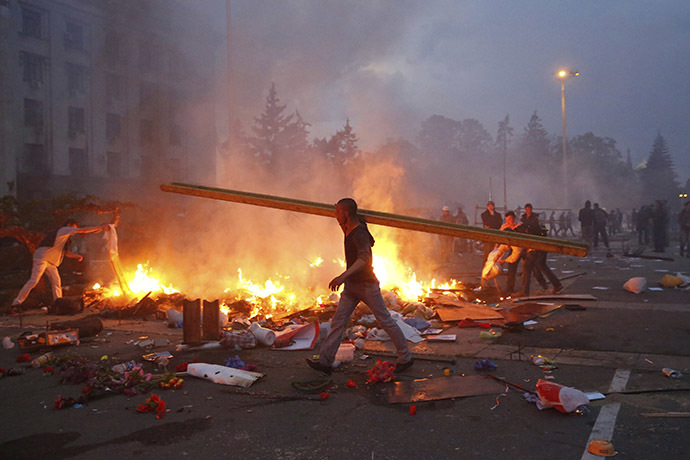
Intervention or diplomacy?
As the Kiev regime puts down genuine popular opposition with brute military force while neo-Nazi militias unleash pogroms against ethnic Russians across the east, the notion that a fair election can be held on May 25 as scheduled is highly questionable. The hastily organized vote is designed to legitimize the new authorities in Kiev, and if the polls are disturbed in any way, Moscow will shoulder the blame and endure another wave of sanctions. If the US and EU endorse Kiev’s military offensive in the east, then there is every reason to believe that they will turn a blind eye to Ukraine’s handling of dissent with force further down the line, especially when discontent rises as the population bears the full brunt of the austerity measures and fuel price increases dictated by IMF loan conditionalities. The failure of the US and EU to acknowledge Kiev’s failure to abide by the Geneva agreement has likely disenfranchised many in Moscow, some of whom may feel that pursuing a diplomatic approach is essentially a futile exercise. Moscow has previously stated that it would use “all means” to ensure the safety of ethnic Russians if they come under threat from Ukrainian forces, and given the current circumstances, some form of intervention may be conceivable.
If Russia decides that the situation in eastern Ukraine has unraveled to the point of intervention being necessary, Moscow would face the heaviest barrage of international criticism and economic sanctions since the end of the Cold War. In a sense, Russia would be playing into the vitriolic anti-Putin narrative, and the consequences could lead to a situation where NATO is emboldened and reinvigorated in the face of so-called ‘Russian imperialism.’ Since the new authorities usurped power in Kiev, the US and its NATO allies have deployed troops in the Baltic states of Latvia, Lithuania, and Estonia, as well as Poland, bringing NATO forces a stone’s throw away from Russian borders. The potential danger of the current crisis spiraling into a hot war involving regional actors would be a grave and irreversible mistake. Washington maintains the highest degree of leverage over Kiev, and although its approach to dealing with Ukraine has been inflammatory and duplicitous, one would hope the Obama administration is sensible enough to discontinue the current policy of overplaying its hand.
Russia has proven to be a reliable partner to the West over issues of mutual concern, such as countering the proliferation of nuclear weapons and strengthening global anti-terrorism cooperation, among other areas. Further deterioration of Russia’s relations with the West can be prevented, and Moscow should continue working toward a comprehensive solution to the situation in Ukraine that would see constitutional reforms to allow greater powers given to the Ukrainian parliament, guarantees on the multi-ethnic orientation of Ukrainian society, full protection of political and civil rights for minorities with the status of the Russian language protected, and ultimately an opportunity for residents of eastern and southern Ukraine to decide their own future through an autonomy referendum. The present scenario defies any simple resolution. As two previous attempts to chart a diplomatic solution to the crisis were entirely disregarded by Kiev and the West, conditions have been created that are not conducive to de-escalation. The danger now is that political posturing and the mutual assignment of blame can lead to a deepening violent destabilization of Ukraine.
The statements, views and opinions expressed in this column are solely those of the author and do not necessarily represent those of RT.
The statements, views and opinions expressed in this column are solely those of the author and do not necessarily represent those of RT.






